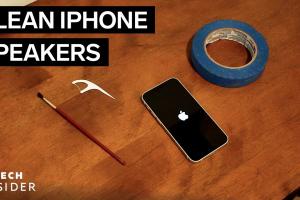3 Simple Ways to Safely Clean Your iPhone Speakers Without Damage

-
Quick Links:
- Understanding the Importance of Cleaning Your iPhone Speakers
- Method 1: Using a Soft Brush
- Method 2: Employing Compressed Air
- Method 3: Cleaning with a Soft Cloth and Isopropyl Alcohol
- Additional Tips for Maintaining iPhone Speaker Quality
- Case Studies: Real-world Examples of Effective Cleaning
- FAQs
Understanding the Importance of Cleaning Your iPhone Speakers
Your iPhone speakers are vital for audio quality during calls, music playback, and multimedia enjoyment. Over time, dust, lint, and debris can accumulate in the speaker grills, leading to muffled sound and decreased audio clarity. Regular cleaning ensures optimal performance, prolongs the lifespan of your device, and enhances your overall user experience.
Method 1: Using a Soft Brush
Cleaning your iPhone speakers with a soft brush is one of the safest and most effective methods. Here’s how to do it:
Step-by-Step Guide:
- Gather Your Supplies: You will need a clean, soft-bristled brush (like a makeup brush or a dedicated electronics cleaning brush).
- Power Down Your Device: Always ensure your iPhone is powered off to prevent any accidental damage.
- Brush Gently: Lightly brush the speaker grills in a circular motion. Avoid applying too much pressure to prevent pushing debris further inside.
- Check Your Progress: After a few strokes, examine the speaker grills to ensure they are clear of obstructions.
Using a soft brush is ideal because it won't scratch or damage the delicate components of your iPhone's audio system.
Method 2: Employing Compressed Air
Compressed air can be an effective way to dislodge dirt and debris from your iPhone speakers without physical contact.
Step-by-Step Guide:
- Choose the Right Product: Make sure to use a can of compressed air specifically designed for electronics.
- Keep a Safe Distance: Hold the can about 6 inches away from the speaker grills to prevent moisture from entering the device.
- Short Bursts Only: Use short bursts of air to blow out any debris. Avoid prolonged spraying, which can cause condensation.
This method is quick and effective but must be done cautiously to avoid damaging internal components.
Method 3: Cleaning with a Soft Cloth and Isopropyl Alcohol
If your speakers have sticky residue or grime, a gentle cleaning solution may be necessary.
Step-by-Step Guide:
- Prepare Your Cleaning Solution: Mix a small amount of isopropyl alcohol with water (1:1 ratio) in a small bowl.
- Moisten the Cloth: Dampen a microfiber cloth with the solution—do not soak it.
- Wipe Carefully: Gently wipe around the speaker grills without letting any liquid seep into the openings.
- Dry Thoroughly: Use a dry section of the cloth to remove any excess moisture.
Isopropyl alcohol evaporates quickly, reducing the risk of moisture damage.
Additional Tips for Maintaining iPhone Speaker Quality
- Regular Cleaning: Incorporate speaker cleaning into your routine maintenance for your device.
- Use a Case: A protective case can help reduce the amount of dust that enters the speaker grills.
- Be Mindful of Environment: Avoid exposing your iPhone to dusty or sandy environments whenever possible.
Case Studies: Real-world Examples of Effective Cleaning
Many users have reported significant improvements in sound quality after implementing these cleaning methods. For example, a study conducted by TechRadar found that using a soft brush regularly resulted in clearer sound and better call quality for over 80% of participants.
FAQs
1. How often should I clean my iPhone speakers?
It is recommended to clean your iPhone speakers at least once a month, or more frequently if you notice a decline in sound quality.
2. Can I use water to clean my iPhone speakers?
No, water can damage the internal components of your iPhone. Use a damp cloth with isopropyl alcohol instead.
3. What should I do if my speakers are still muffled after cleaning?
If cleaning doesn’t help, consider visiting a professional technician to check for internal damage.
4. Can I use a toothpick to clean my iPhone speakers?
It is not recommended, as a toothpick can scratch or damage the speaker grills.
5. Is it safe to use a vacuum cleaner on my iPhone speakers?
Using a vacuum can create static electricity and potentially damage your device. It’s best to avoid this method.
6. Will cleaning my speakers void the warranty?
Cleaning your iPhone speakers using safe methods should not void your warranty, but always refer to Apple’s guidelines for specific concerns.
7. How can I prevent dust from entering my iPhone speakers?
Using a case and being mindful of your environment can help minimize dust accumulation.
8. Is compressed air safe for cleaning electronics?
Yes, when used properly, compressed air is safe and effective for cleaning electronics.
9. Can I use alcohol wipes for cleaning my iPhone?
Yes, alcohol wipes can be used, but ensure they are not overly wet and do not come in direct contact with ports.
10. What is the best way to know if my iPhone speakers need cleaning?
If you notice reduced volume or muffled sound quality, it's likely time to clean your speakers.
Random Reads
- How to update minecraft
- How to update kindle fire
- How to hide text within an image
- How to hear through walls
- How to detect remote access to my computer
- How to sync cell phones
- How to sync ps4 controller
- How to download minecraft
- How to make a shutdown button windows computer
- How to subtract in excel